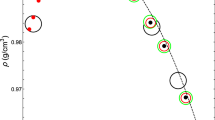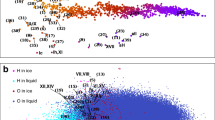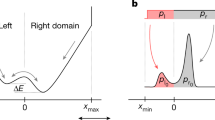Abstract
In 1902, H. L. Callendar1 suggested that the variation of specific heat of water with temperature could be explained by assuming that a volume of liquid in equilibrium with its vapour contained dissolved in it a number of molecules of its own vapour. The number of molecules assumed to be dissolved was such that, as a vapour, they would occupy the same volume as the liquid, so that the concentration of dissolved molecules in the liquid was the same as that of ordinary molecules in the vapour.
This is a preview of subscription content, access via your institution
Access options
Subscribe to this journal
Receive 51 print issues and online access
$199.00 per year
only $3.90 per issue
Buy this article
- Purchase on Springer Link
- Instant access to full article PDF
Prices may be subject to local taxes which are calculated during checkout
Similar content being viewed by others
References
Callendar, Phil. Trans. Roy. Soc., A, 199, 147 (1902).
Eyring, J. Chem. Phys., 4, 283 (1936).
Fowler, R. H., "Statistical Mechanics" (Cambridge University Press 1936), 845.
Kirkwood, J. Chem. Phys., 7, 908 (1939).
Author information
Authors and Affiliations
Rights and permissions
About this article
Cite this article
SILVER, R. H. L. Callendar and the Theory of the Liquid State. Nature 151, 588–589 (1943). https://doi.org/10.1038/151588b0
Issue Date:
DOI: https://doi.org/10.1038/151588b0
Comments
By submitting a comment you agree to abide by our Terms and Community Guidelines. If you find something abusive or that does not comply with our terms or guidelines please flag it as inappropriate.



